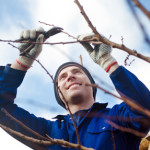By Mark Chisholm, certified arborist
When it comes to tree care, some jobs are too big and too dangerous, or just need professional expertise to keep the tree healthy. My rule of thumb: unless you can work with both feet on terra firma, you should hire a professional tree service. Working at height requires proper training and protection due to a number of risky variables such as electrical wires, wildlife, nearby fences, buildings or home s. Of course, hiring a tree service comes with its own set of risks. To get your money’s worth and protect your interests, you need to ask your tree care professional these important questions and make sure you understand and agree with their answers.
s. Of course, hiring a tree service comes with its own set of risks. To get your money’s worth and protect your interests, you need to ask your tree care professional these important questions and make sure you understand and agree with their answers.
- Will they provide an up-to-date certificate of insurance and a copy of their work contract? This should be your first and most important question. You want to ensure they are properly insured and that you will not be liable for damage, accidents or injuries.
- What are their credentials? Try to hire a company with an International Society of Arboriculture (ISA) certified arborist, a Tree Care Industry Association (TCIA) Accredited Business or one employing a Certified Tree Care Safety Professional (CTSP). Will they be working in proximity to electrical conductors? If so, they will need to be Approved Line-Clearance Arborists.
- Can they provide a list of references? Any quality company will be
happy to share a list of satisfied customers. Ask for customers that they have done work for in the past month or so; you don’t want ancient history. - Will they give you a detailed estimate? Get written estimates from three equal companies to compare prices and understand the scope of the job, which leads into the next question.
- How will the job be approached and what equipment will they use? You don’t want massive power equipment driving over your lawn and flowerbeds causing collateral damage unnecessarily. If they are going across your lawn, make sure they know the locations of sprinkler heads or other objects that may be damaged. What is their policy if they damage something and is it acceptable to you? It may be a good idea to photograph the area before work begins so you have a record in case there is damage. Make sure you understand how they will clean up during and after the job.
- How long will the project take? This is why getting an estimate is h
ndy. One company might say three days while another company says three hours. - Does the company appear professional? What does their company truck look like, is it well taken care of? Is the truck clean and in good shape? If they don’t take care of their equipment, do you think they will take care of your tree and property? Do they have a website? Design and content can give you a sense of their professionalism, as can the appearance of the vehicles they use on jobs. That can give you an idea of how they run their business.
- Do they use spikes to climb trees while pruning? Unless you’re removing the trees, demand they not use spikes, which causes unhealthy wou
ds. - Do they advertise “topping” (removing live sections from the top of the tree)?This is another poor practice, particularly for large, healthy hardwood trees and would indicate that you should continue your search.
- Will the crew be using hardhats and other personal protective equipment while on your property? The Occupational Safety and Health Administration (OSHA) requires that personal protective equipment be used for any tree care operation. A reputable tree care service will require their workers to be protected.
It’s important to protect yourself and your property by hiring a tree care professional for dangerous jobs. It’s equally important to protect yourself and your “tree investment” by asking these top ten important questions. For more i
formation, including resources to help you find a tree care service, visit www.treesaregood.org or www.treecaretips.org.
About Mark Chisholm
One part acrobat, one part expert rope climber, one part tree physiologist, and several parts competitor and thrill seeker, Chisholm is a third-generation arborist with his family-owned Aspen Tree Expert Company in New Jersey. His expertise in tree care has made him a sought after consultant and industry spokesperson for the world of arboriculture, and he regularly travels the globe to consult with international arborist associations.
Chisholm has won the International Society of Arboriculture (ISA) New Jersey Chapter Tree Climbing Championship 21 of the last 22 years and has conquered the wider tree-climbing world on multiple occasions.
Sourced from STIHL